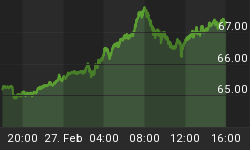The topic that everyone has been talking about for some time now but especially in recent days, namely, oil. The headlines are ominous: "Oil supply fears drive price of crude higher" and "Energy costs hit record highs" said the Financial Times this weekend.
The price of crude oil continues to march higher and higher with seemingly no end in sight. The upside momentum behind the rise has been impressive to say the least with further upside potential in to the $68-$70 area a good possibility. Analysts have already started speculating as to what will happen if oil reaches above $70 and what the impact will be on the economy if sustained.

With this much strength in the price of oil and gas and other energy-related materials, why hasn't there been as yet a major impact on the equities market? Why have stocks shrugged off the seemingly interminable rally in the oil price? These are questions the financial pundits are asking. But the more important question why is the muted reaction (or near total lack thereof) from those who must foot those ever increasing fuel bills.
The response of Americans to the record high gas prices this summer has been perplexing to say the least. According to travel statistics, this summer has already witnessed record travel on the highways as millions have hit the roads on vacations and weekend travel getaways despite the increased cost of fuel. The airlines, after a multi-year slump in travel, have likewise seen a large increase in passengers this summer. It almost seems like the higher fuel prices - far from discouraging travel - have actually stimulated it!
But when will consumers finally stamp down their collective foot and say, "Enough is enough!" The voracious travel spending this summer has left the oil marketeers laughing all the way to the bank as they now know they can continue to push the price of oil higher (through contrived shortages and market manipulation) without fear of reprisal from throngs of angry Americans (a la' the 1970s). What has changed the character of the American public from angry protestations again the oil interests 30 years ago to complete docility and servile acceptance of higher fuel prices? Whatever the reasons, there is no outrage and history has shown that without this vital element there is no reason to expect a reversal of the price trend anytime soon.
Does anyone care what the general public thinks about the price of gas and oil? Yes they do! There have been several "feelers" put out by the press lately, including numerous viewer polls on financial television asking consumers what they believe to be the reason behind the oil/gas rally. On the AOL news headlines wire, a survey asks viewers how they are "coping" with $3/gasoline.
An initial test of the American public's psyche was performed back in 2000 with the massive spike in the price of natural gas. The clamor from consumer was deafening and the spike quickly gave way to an equally swift, sharp decline in the NG price from a high of $10.00/MMT to a low of $2.00/MMT. The petroleum interests were forced to back down from what was later exposed as a manipulation campaign by speculative interests.

Even as recently as March there was at least a glimmer of anger among the public as they began clamoring for answers as to why oil was so high. Within a short time of venting this frustration the oil price began a 2-month decline of nearly $12. This was, of course, a short-lived correction, for once the glint of public anger was satisfied, the oil price began yet another sustained upsurge.
The U.S. Strategic Petroleum Reserve could be used to provide at least temporary relief to the persistent rise in the oil price. This tactic was employed back in 1998 to give American consumers $10/barrel oil and $1/gallon gasoline (remember those heady days?) It's easy to envision the runaway uptrend of the past couple of years as a consolation to Big Oil for their having to "suffer" through those extremely low prices of yester-year. But low oil and gas prices didn't last long back then and the bull market in energy prices that has developed since then has lasted for over three years.
With the advent of ultra-deep drilling and the discovery that there are seemingly inexhaustible reserves of oil deep within the earth (including a find of some 184 billion barrels in the Gulf of Mexico off the shores of Louisiana), the term "oil shortage" has no validity. The impulse behind rising oil prices has been contrived shortages and a dependance upon the public's increasing complacency. Until the "sleeping giant" of the American public awakens from slumber to cry out against the ever-rising oil "tax" we can only expect to see higher prices in the future.















